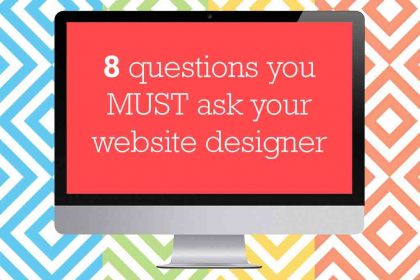A quick guide to getting your business website off the ground
Are you at the stage where you’re thinking about your business website? Read a quick guide on getting started.
A website of some sort is an essential for most businesses today. But where do you start when planning one? To help you, hosting solutions provider cloudabove have put together a quick guide that covers the key basics:
- Choosing a domain name.
- Choosing your hosting provider.
- Creating your website.
- Site builders vs WordPress Host.
How to choose a domain name
The first thing you need when building a website is a domain name, such as catsanddogs.co.uk. When choosing your domain name, you need to make sure it’s easy to remember, short and to the point. It also should be relevant to the service you offer or your company name.
Another thing to bear in mind is that your domain name will probably also be your email address (for example, hello@catsanddogs.co.uk).
Domain names are relatively cheap. Most web hosting companies will give you the option to buy your domain name through them, but there’s no need to do so if you don’t wish to; your domain can be registered with one company, and your web hosting with another.
(You can read more advice on choosing the right domain name here.)
Why do you need website hosting?
As well as a domain name, you’ll also need web hosting. Many people aren’t sure what this is, so we’ll quickly explain.
Your website files will sit on a worldwide accessible server. When a visitor types in your domain name or click on a link, that server will present the visitor with your website. So when, for example, you visit eBay.co.uk, you’re accessing a server that hosts the files for eBay’s website. And the site’s files are served to you. Voila! You’re now on eBay.
The servers used to host websites are often enterprise level servers that sit within a guarded datacenter for ultimate data protection, speed and power availability.
It would be fairly expensive to purchase your own server and pay datacenter fees, so for most people it makes sense to purchase website hosting through a dedicated web hosting company. To find out more read more about Web Hosting Hub.
How to choose your hosting provider
A website is only as good as its host, so you need to be picky when it comes to selecting your web hosting provider.
When you find a web hosting company that looks suitable, type their name into Google with ‘reviews’ at the end to see what other customers have to say about them. For example, “cloudabove web hosting review”.
If people are raving about them you know you’re onto something good. You can also check public reviews sites like TrustPilot or Serchen.
Some points to consider when choosing web hosting:
- Support – make sure to do your research when it comes to support. There’s nothing more frustrating than either no telephone support or being on hold for 40 minutes while you wait in a queue, as so many faceless companies expect you to do.
- Price – there are many website hosting companies to choose from. Some try their utmost to upsell and rip you off. Others seem too good to be true (it’s usually the case). The average cost for UK hosting is between £3 to £12 a month.
- Reliability – a good uptime % is highly recommended. If your webhosting provider goes down, your website goes down with it. You can usually check their SLA uptime on their website. It doesn’t hurt to ask the company if they have suffered much downtime within the past year.
- Freebies and benefits – be careful here. Often companies will run a too good to be true promotion, such as a year’s free hosting when signing up with them. You will more than likely find yourself paying a hefty renewal fee and contract fee once the offer has expired.
- Offers you don’t need – don’t be sucked in by offers such as free Google Adwords credit or software you will never use. But DO look for free domains as part of the package.
- Company ethics – you want to establish a nice working relationship with your hosting company, so make sure that you are their best interest, not your money. Avoid services with long contract periods (no contract would be ideal).
Creating your website
The best option for most people when building a website is to work with a professional web developer. So if your budget allows, do so. (Read eight questions you MUST ask a website designer/developer before hiring them.)
Hiring a professional will save you on headaches and stress. Usually your website will be optimised for performance and hopefully SEO (Search Engine Optimisation) friendly.
If a website developer is not an option, or you would just like to give it a go yourself, then WordPress or a WordPress content editor could be a good choice.
WordPress is the world’s largest and free CMS (Content Management System). Depending on your hosting provider, it’s usually installed within a few clicks in your hosting area. You may even be able to request that your hosting company installs it for you.
Once WordPress has been installed, you can simply download a theme and begin creating. There are literally millions of themes to choose from, and WordPress makes building your site relatively quick and easy.
After watching a few videos on YouTube on the basics of WordPress you should be ready to download a theme of your choice and begin customising. (We’ve seen some fantastic websites built by non tech savvy business owners.)
WordPress has some great plugins that quickly add functionality to your website, such as turning your basic website into an online shop, boosting your website performance, helping you with search engine optimisation, and basic tasks such as adding a contact form or image gallery.
Most themes are free, however if you want a reliable theme with regular security updates, easy-to-use user interfaces and more, a paid theme might be your best option. It doesn’t have to break the bank – we’ve seen decent themes for as little as £15.
Whats a ‘Plugin’? A plugin is like an app on your mobile phone. So just like, when you want an app to tell you the weather you search for it on your phone’s app store, if you want a weather app on your website, you simply search for a weather plugin.
If you need simple, practical advice on building a WordPress site from scratch, you’ll find this brilliant, step-by-step guide helpful.
Site builders vs WordPress (and traditional hosting)
If you’re building your own website, you may decide to use a website builder such as Weebly or Wix. And it’s easy to see why they’re so popular.
To start with, they’re reassuringly easy to use. They’ll also probably enable you to get your website online faster than creating it using WordPress or hiring a website developer. However there can be significant downsides to online site builders.
Services like WordPress have a more hands-on approach, with a bigger learning curve. But they also offer much more flexibility – not just with the website itself, but with your web hosting costs and management going forward.
When you design your website using a paid-for website building service such as Weebly or Wix, please be aware that your website and content are tied to them. This means they effectively own the website, and you cannot move it away from their services in the future.
Many site building services also tie you down to their often more expensive web hosting fees and email services, by requiring that your web hosting and email must be purchased through them in order to use their template builder service.
You’ll will be limited to their templates and editing views too, and it’s often very hard to implement custom features that you may require.
The pros of site builders
- Speed – it’s often the quickest way to get your website online.
- Drag and drop features – their templates allow you to drag elements such as images onto a page.
- Minimal learning curve – you can jump right in and start creating your website.
- Simple to use – you don’t have to know code to make a fantastic website.
The pros of WordPress (and traditional hosting)
- Better features – they have sophisticated functionality with great flexibility.
- Fully in control – the sky’s the limit!
- Reliability – 99.9% uptime.
- Speed – servers are tweaked for optimum website performance.
- Variety – you’re spoiled for choice both in the website’s functionality using plugins, and the wide range of themes with customisation options.
- Simple to use – you don’t have to know code to make a fantastic website.
- You own everything – the website and content is yours to do what you want with.
The cons of site builders
- Ownership – your website is owned by the site builder company, which means you can’t move it elsewhere in the future.
- Limited choice – you will only have a set amount of templates to modify, and you are contained within their limited environment.
- Premium charge – you will be paying a premium to host your website compared to many other hosting companies. Usually this is for using their site builder services.
- Email add ons – many site builders charge extra for email.
The cons of WordPress (and traditional hosting)
- Learning curve – compared to site builders, you will need to spend a little more time learning how to get around.
Need more advice on creating your website?
You’ll find more tips in these articles:
- Five things your business homepage MUST include
- How to write a perfect About page
- How to write SEO copy for your website
- A step-by-step guide to building an online shop
If you have more questions about creating your website, you’re welcome to contact cloudabove. cloudabove can provide you with fast and reliable hosting with unmatched support – and have you up and running within minutes.










